by Marcus Boston Jr. | Mar 8, 2024
The form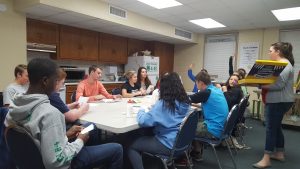 ulation of an effective camp counselor training program is crucial for ensuring a positive and enriching experience for both campers and counselors alike. The primary objective of any summer camp should be to recruit, train, and support competent counselors who can contribute to the overall enjoyment and success of the camp. Counselors play a pivotal role in shaping the camp experience, and their training is essential in achieving this goal.
ulation of an effective camp counselor training program is crucial for ensuring a positive and enriching experience for both campers and counselors alike. The primary objective of any summer camp should be to recruit, train, and support competent counselors who can contribute to the overall enjoyment and success of the camp. Counselors play a pivotal role in shaping the camp experience, and their training is essential in achieving this goal.
When designing a counselor training program, it is imperative to cater to various learning styles and preferences among participants. This includes accommodating visual, auditory, and kinesthetic learners by incorporating a diverse range of methods and activities into the training sessions.
Five key components of a successful 4-H camp counselor training program:
- Community Service: Initiating activities that allow counselors to engage in community service not only fosters a sense of social responsibility but also serves as an effective icebreaker, facilitating bonding among participants. (examples: gleaning citrus trees, sorting at food banks, assisting with clothing drives, etc.)
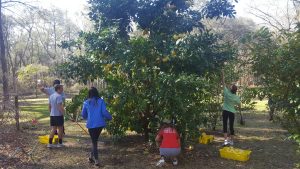
- Ice Breakers: Commencing each training session with ice breakers and team-building activities helps to create a cohesive and supportive atmosphere among counselors, setting a positive tone for the camp.
- Multimedia Presentations: Utilizing multimedia presentations comprising visuals and quotes can effectively highlight important concepts and enhance the learning experience for counselors.
- Hands-On Activities: Incorporating hands-on activities into the training program ensures active engagement and caters to the diverse learning styles of participants.
- Social Time: Allowing for social interactions and downtime during the training schedule enables counselors to build relationships and establish a sense of camaraderie, which is essential for effective teamwork during the camp session.
Additionally, facilitating structured discussions and reflection sessions after completing activities enables counselors to share their experiences, analyze their learning, relate it to real-life situations, and apply newfound knowledge to future scenarios.
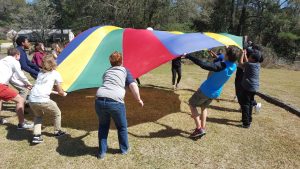 Furthermore, individuals interested in assuming leadership roles at the camp should undergo a selection process involving applications and interviews to ensure suitability for the position. This ensures that counselors align with the principles of Positive Youth Development, which is integral to the camp’s mission.
Furthermore, individuals interested in assuming leadership roles at the camp should undergo a selection process involving applications and interviews to ensure suitability for the position. This ensures that counselors align with the principles of Positive Youth Development, which is integral to the camp’s mission.
Source: Kentucky 4-H Counselor Training Guide
by pmdavis | Nov 21, 2023
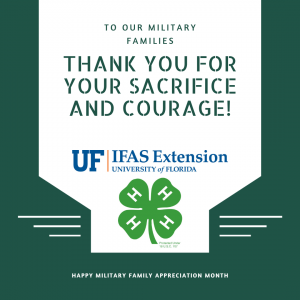
We love our Military Families!
November is a month many of us celebrate our families and have traditions we enjoy annually. November is also designated as the National Military Family Appreciation Month. For our military families it is a time when the country recognizes the nearly 5.2 million service members and their families. UF/IFAS Extension and 4-H are proud to be a part of the military family working with youth centers across the nation to have some consistency for military kids. 4-H works will military programs worldwide to support our military youth at bases and in local communities. We recognize that our military youth must cope with many circumstances while their parent or sibling is working often away from home. Causing a hole created by the absences during many life events. Military life imposes unique demands on the family, from a change in family structure to the stress of someone missing from events, to the worries of a family member being hurt while working.
Since many of us have a little extra time during the holidays there are several things you can do to show your support of our military members and their families. We as non military families celebrate with each other at family/friend gatherings etc. and sometimes forget that our military friends are away from home and missing these traditions. We can help celebrate, recognize, acknowledge, and show gratitude for those sacrifices our military family’s make so each of us can enjoy freedom by sharing our love.
You can do simple things to demonstrate your appreciation and gratitude for their sacrifice, resiliency, and courage.
Show your support by:
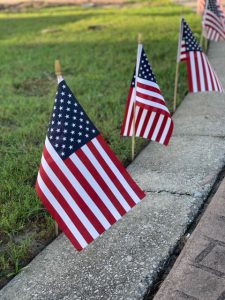
Celebrate our Freedom and express your appreciation to military families!
- Expressing Gratitude and appreciation: You can take a moment to thank military families for their sacrifices and service to the nation. You can send cards, write letters, if you do not know anyone here is a local organization that can help get them to the troops. December 1 is the deadline for Holiday themed cards to go out. You can give shout outs on social media using the hashtag #MilitaryFamilyAppreciation
- Sending care packages to veterans and military families overseas or donate to to Military Support Organizations.
- Giving the gift of time by: visiting a local veteran, spending time with a military family, or volunteering at a veterans organization (contact your local VFW, American Legion, VA hospital or veteran’s shelter).
- If you know a military family, open your doors to share the holidays with you by offering help with tasks like childcare, home maintenance, or meal preparation.
- You can also show your support by participating in community events and initiatives that celebrate and support military families in your area.
I hope you will join Florida 4-H #Florida4H and our Nation #MilitaryFamilyAppreciation to celebrate Military Family Month, by doing simple things to demonstrate your appreciation and gratitude to our military members and their families! Have a wonderful Thanksgiving.
by Marcus Boston Jr. | Apr 26, 2023
Youth shows and fairs provide a valuable opportunity for young people to develop a wide range of life skills. From responsibility and communication to planning and organization, these events offer a unique learning experience that can help young people build important skills for success in all areas of life.
Can a youth’s participation in County fairs and Shows help to develop them into responsible adult? The answer is yes! The Florida 4-H Program seeks to be inclusive to all youth by using a variety of vehicles to teach youth life skills in traditional and non-traditional settings. A recent article in The Journal of Extension by Oregon State professionals found that “having fun” “spending time with friends” and “teamwork” were the highest-rated motivators for youth that participated in fairs.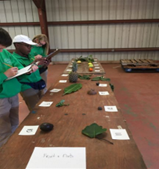
The study also revealed that participation in fairs through 4-H had a significant positive effect on participants’ levels of caring, contribution, and character. These characteristics are also part of the Essential Elements of 4-H that youth experience by being in an active 4-H program throughout the year. Those elements are Belonging, Independence, Generosity, and Mastery.
One of the most important skills that youth learn through participation in youth shows and fairs is responsibility. Whether they are caring for animals, plants, or other projects, youth must take on the responsibility of ensuring that their projects are healthy, well-cared for, and ready to be presented to judges and visitors.
 Communication is another key skill that youth develop through participation in youth shows and fairs. Through active participation youth learn the ability to articulate complex ideas, listen actively, and respond thoughtfully to questions and feedback.
Communication is another key skill that youth develop through participation in youth shows and fairs. Through active participation youth learn the ability to articulate complex ideas, listen actively, and respond thoughtfully to questions and feedback.
In addition to these skills, youth shows, and fairs also emphasize important values such as sportsmanship and fair play. Participants are encouraged to respect their competitors, accept both victories and defeats graciously, and uphold the highest standards of ethical behavior. This helps young people develop important social skills, including the ability to work collaboratively with others and build positive relationships.
Finally, participation in youth shows and fairs can help young people develop resilience and perseverance in the face of challenges and setbacks. These events can be competitive and stressful, but they also offer opportunities for young people to learn from failures, bounce back from disappointments, and remain motivated to achieve their goals.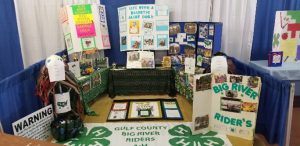
A few of the Florida 4-H Shows and Fairs are as follows:
-
- State 4-H Dairy Show Okeechobee March
- 4-H Chick Chain Show Chipley April
- Area North Horse Show Green Cove Springs May
- North Florida Fair Tallahassee November
*For additional opportunities to participate in 4-H Shows and fairs please contact your local 4-H office.
In conclusion, participation in youth shows and fairs can offer a unique and valuable learning experience for young people. By developing important skills such as responsibility, communication, planning, and organization, as well as important values such as sportsmanship and fair play, youth can build the foundation for success in all areas of life.
References:
More information on this study can be obtained by visiting the Journal of Extension at www.joe.org and viewing volume 45, number 6.(Arnold, Meinhold, Skubinna, and Asthton)
by Marcus Boston Jr. | Apr 13, 2023
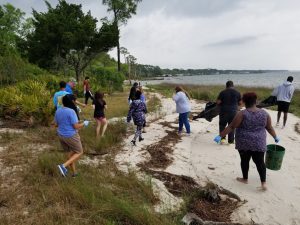 Life skills for youth are defined as a set of abilities and competencies that enable young people to successfully navigate their daily lives and achieve their goals. These skills are essential for personal and professional development and help “prepare youth to be responsible citizens and productive members of the workforce.” Florida 4-H provides many opportunities for young people to obtain life skills through project work, community and afterschool clubs, workshops, and leadership programs.
Life skills for youth are defined as a set of abilities and competencies that enable young people to successfully navigate their daily lives and achieve their goals. These skills are essential for personal and professional development and help “prepare youth to be responsible citizens and productive members of the workforce.” Florida 4-H provides many opportunities for young people to obtain life skills through project work, community and afterschool clubs, workshops, and leadership programs.
As a state-wide organization, Florida 4-H prioritizes the development of communication, higher-order thinking, and appreciation of differences. These three life skills are infused throughout our educational activities and programs because they are essential workforce skills. Below are a few examples of local programs that focus on helping youth develop life skills:
- Communication: 4-H provides opportunities for youth to develop their communication skills through the Florida 4-H Public Speaking Contest, demonstrations, and presentations at County/District and 4-H University. These activities help youth learn how to articulate their ideas clearly and confidently.
- Higher Order Thinking: this includes both decision-making and problem-solving.
- Decision-Making: 4-H offers various programs, such as judging contests at fairs, 4-H event planning committees (district/state council), and club activities that help youth develop their decision-making skills. These activities help youth learn how to make informed decisions and evaluate the outcomes of their choices.
- Problem-Solving: 4-H offers various programs, such as STEM projects and engineering challenges, that help youth develop problem-solving skills. These activities encourage youth to think creatively and find innovative solutions to complex problems.
- Appreciation of Differences– 4-H helps youth learn how to respect and communicate with people who might be different from themselves. Many of our programs offer opportunities for youth to meet new people and explore different cultures. We also help youth learn how to address conflict in a positive way through civil discourse. Older youth can participate in exchange programs with 4-Hers from other states and countries (4-H is in all 50 states and 32 other countries!).
- Teamwork: Through 4-H club projects, counselor training, and community service activities, youth learn how to work collaboratively with others towards a common goal, which helps them develop important teamwork skills.
- Responsibility: 4-H club projects and community service activities encourage youth to take responsibility for their actions and to learn the importance of following through on commitments.
- Leadership Development: 4-H offers various programs, such as officer training, public speaking, county/district councils, and community service projects, that help youth develop their leadership skills.
- Self-Confidence: 4-H programs provide a safe and supportive environment where youth can build their self-confidence through public speaking, leadership roles, and community service activities.
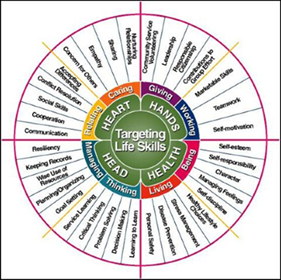
- Service Learning: Through 4-H club work, obtaining a Florida 4-H Community Pride Grant, and active membership on county/district councils, youth members take part in projects and experiences that help them how to become active participants in the communities and apply their experiences to real-life situations.
These are not the only life skills youth in Florida can learn and practice through 4-H- but they are part of almost every program we offer. These are examples of the priority life skills that Florida 4-H promotes among youth, with a focus on cognitive development, interpersonal skills, leadership, civic engagement, and practical skills. Florida 4-H aims to provide a comprehensive youth development program that equips young people with the skills they need to succeed in their personal lives, careers, and communities. Active involvement in 4-H will help members to connect life skills obtained through their 4-H involvement to real-life experiences. For more information on these youth leadership opportunities please contact your local 4-H office.
If you would like to help Florida 4-H teach life skills, or get your child involved in our program, reach out to your local UF/IFAS County Extension Office. There is an office in every county in Florida. Spring is a great time to get involved, because 4-H offers several summer programs for youth to develop life skills!
References:
Marilyn N. Norman and Joy C. Jordan.2018.Targeting Life Skills. EDIS document #4HSFS101.9
Hendricks, P.(1988). Developing Youth Curriculum Using The targeting Life Skills Model
Michigan State Extension. 2016. 4-H Head Life Skill Sheets.(4-H1679)
by Heather Kent | Feb 10, 2023
 One of the things I love about 4-H is that it offers so many different opportunities for youth to learn leadership skills while pursuing and exploring their sparks. And leadership roles are not confined to the club level- there are opportunities for youth to serve at the district, state, and even national levels. Youth leaders are grown, not born. And just like any living thing, they must be nurtured over time in an intentional way to develop strong leadership skills. This article will describe what a strong youth leadership team looks like and provide some resources to help grow your team. Over the years, I have had the privilege of working with some amazing youth leadership teams at all levels of the 4-H organization. But it was something that we had to cultivate over time- we didn’t start out as a high-functioning team. A strong youth leadership team can be identified by the following five characteristics (download this graphic):
One of the things I love about 4-H is that it offers so many different opportunities for youth to learn leadership skills while pursuing and exploring their sparks. And leadership roles are not confined to the club level- there are opportunities for youth to serve at the district, state, and even national levels. Youth leaders are grown, not born. And just like any living thing, they must be nurtured over time in an intentional way to develop strong leadership skills. This article will describe what a strong youth leadership team looks like and provide some resources to help grow your team. Over the years, I have had the privilege of working with some amazing youth leadership teams at all levels of the 4-H organization. But it was something that we had to cultivate over time- we didn’t start out as a high-functioning team. A strong youth leadership team can be identified by the following five characteristics (download this graphic):
- Clarity
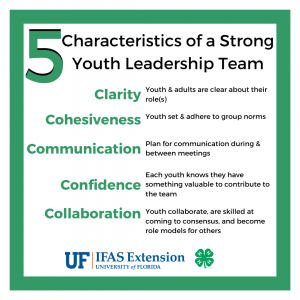
- Cohesiveness
- Communication
- Confidence
- Collaboration
Clarifying the roles of each team member
It’s essential that everyone in the group understands their role and that they have something valuable to contribute to the team. Youth are usually pretty quick to understand their role- often it involves planning an event or solving a community issue through service learning. But the roles of the adults are much vaguer. Some adults view the role as advisory the same way they would a dictator. They want to tell the youth what they should do when they should show up, and how to do everything. But as advisors, our role is to empower youth- make sure they understand their role, and that they are cohesive, or have ground rules for how the group will function.
Establishing a sense of cohesiveness
Once everyone is clear about their roles on the team, the group needs to establish ground rules, or group norms to create a sense of cohesiveness. If the adult mentor sees the group wandering away from the group norms, then it is their job to call the youth out on it and bring them back to a more cohesive state. Not too long ago, I was working with a group of teens to plan a retreat. We had a new member who was constantly putting down other youth’s suggestions. The group got quiet except for the outspoken youth. It was my job to remind everyone that one of our group norms is that each person gets an opportunity to speak, and we don’t put down others’ ideas. Holding the group accountable for these group norms keeps the group cohesive and focused, which is essential for building the next characteristic, communication.
Communication
Leadership teams are a great place for youth to practice communication skills- particularly if they are nervous about speaking in front of large groups. Typically the youth leading the team is responsible for making sure everyone is recognized and heard. However, some youth might need encouragement to speak up- that’s when the adult advisor can help! It is also important to discuss how the team wants to communicate outside of meeting times- reminders about meetings, or any other issues that might come up in-between meetings. As the advisor, make sure everyone comes to a consensus on how and how often the team wants to communicate within meetings (and outside of meetings). As youth become more comfortable with communicating, their confidence will grow.
Confidence
When the members of your youth leadership team are clear about their roles, are cohesive in their approach to leadership, and communicate well with each other, they will be empowered to lead. Teams that are empowered understand that every person on the team has something to contribute. As adults, it’s often easier to just “do it ourselves,” but instead we need to empower youth to take responsibility for a different part of the program the youth are leading. However, we do need to make sure they have the information and tools they need to be empowered. For example, if they want to do an activity they have little experience with, such as sewing dog toys for a pet shelter, connect them with people who have experience and expertise with that type of activity.
Collaboration
The ultimate characteristic of a strong leadership team is collaboration. It is the combined effect of the other four characteristics working together in unison. The collaboration stage is also when youth become role models- not only for other youth but for adults as well. And that is when organizations begin to grow. People will be curious about why and how your youth are working so well together.
Additional Resources:
The UF IFAS publications listed below are free downloads that include hands-on, experiential activities you can do with your youth to help build a strong leadership team:
The best-selling book 7 Habits of Highly Effective Teens written by Stephen Covey is a must-read for any 4-H faculty, staff, or volunteer working with teen leaders.
- Covey, S. (1998). The 7 habits of highly effective teens: the ultimate teenage success guide. New York Simon & Schuster.
by Heather Kent | Jan 13, 2023
Did you know that MLK Day is the only federal holiday designated by US Congress as a national day of service? Instead of a “day off” from school or work, Americans are encouraged to spend the day serving others. Coretta Scott King said:
“The greatest birthday gift my husband could receive is if people of all racial and ethnic backgrounds celebrated the holiday by performing individual acts of kindness through service to others.” MLK Day is always the third Monday of January.
In honor of Dr. Martin Luther King, Jr.’s legacy of service, this blog post brings together several resources to support 4-H service projects to live out our motto, “make the best better.”
What is the Difference Between Service Learning and Community Service?
Service to the community is one of the pillars of 4-H membership. Our pledge includes “My HANDS to larger service.” All 4-H members and clubs are encouraged to plan and execute at least one service project each year. Community service and service learning are often confused. Community service can be court-mandated and sometimes has a negative connotation. However, the biggest difference between community service and service learning is that community service is usually a “one and done” activity where youth collect food, clothes, or other items for a local organization or pick up litter. There is nothing wrong with these types of activities, but youth usually have little input on them, and they are one-time events. This is perfect for younger youth. In contrast, service learning is a longer-term process where youth identify a community need, develop a proposal or plan to address that need, and often involve other community organizations or officials to take action. Service learning is a great way for older youth and teens to develop awareness and empathy. For more information about the differences between service learning and community service, check out our previous blog post.
Getting Youth Involved in Service to Others
Service to others is a huge part of the 4-H Model. Not only is it part of our pledge, Generosity is one of the 4-H Essential Elements, and something we strive to integrate throughout our programming. 4-H Clubs are encourages to participate in at least one community service or service learning project each year- it one of many standards for club and individual members. If you are not familiar with standards of excellence, it is part of our 4-H Awards and Recognition Program. To learn more, check out this previous blog post or be sure to attend our workshop on Awards and Recognition next weekend at our Northwest 4-H Volunteer Forum.
Finally, there is a grant program to help clubs with service learning! It’s called 4-H Community Pride, and not only does this program provide funding for service learning, there is a comprehensive leader’s guide to help volunteers, youth, and parents plan, execute, and celebrate thier service learning.
Ideas to Kick Start Community Service or Service Learning
If you are in need of some fresh ideas for service learning, be sure to read “17 Ways to Kick Start Your Service Learning.” We will also offer a workshop on Service Learning during our Northwest 4-H Volunteer Forum next weekend in Destin, FL. Finally, during our upcoming Northwest 4-H Teen Retreat, youth will have the opportunity to participate in a service project our youth planning committee selected. They will be making teddy bears to give away at a summer camp for youth with disabilities.
 ulation of an effective camp counselor training program is crucial for ensuring a positive and enriching experience for both campers and counselors alike. The primary objective of any summer camp should be to recruit, train, and support competent counselors who can contribute to the overall enjoyment and success of the camp. Counselors play a pivotal role in shaping the camp experience, and their training is essential in achieving this goal.
ulation of an effective camp counselor training program is crucial for ensuring a positive and enriching experience for both campers and counselors alike. The primary objective of any summer camp should be to recruit, train, and support competent counselors who can contribute to the overall enjoyment and success of the camp. Counselors play a pivotal role in shaping the camp experience, and their training is essential in achieving this goal.
 Furthermore, individuals interested in assuming leadership roles at the camp should undergo a selection process involving applications and interviews to ensure suitability for the position. This ensures that counselors align with the principles of Positive Youth Development, which is integral to the camp’s mission.
Furthermore, individuals interested in assuming leadership roles at the camp should undergo a selection process involving applications and interviews to ensure suitability for the position. This ensures that counselors align with the principles of Positive Youth Development, which is integral to the camp’s mission.








